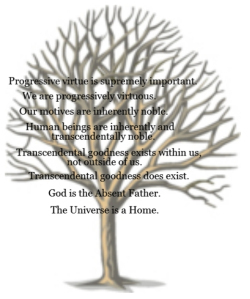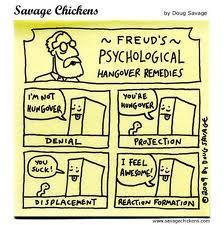Gordon Pine's Blog, page 4
February 10, 2014
Worldlove
Progressives tend to believe that sensitivity, empathy, righteousness and love are extremely important and should be the core of a progressive society.
The unconscious logic supporting this belief is as follows, starting from the “Human beings are inherently and transcendentally noble” branch of the newthink worldview tree:
• Human beings are inherently and transcendentally noble.
• Our motives are inherently noble.
• We are progressively virtuous.
• Progressive virtue is supremely important.
• Sensitivity, empathy, righteousness and love are extremely important and should be the core of a progressive society.
Here’s a new definition:
worldlove n : a bundle of emotions which are typically dominant in progressives, including sensitivity, empathy, righteousness and love

Peace, Love & Happiness (Photo credit: las – initially)
It’s not coincidental that this sensitive and loving righteousness that I call worldlove is emblematic of the feelings of a good mother. The prototypical emotional package of mothers has been sublimated and emerges as the emotional core of progressives, while the object of this sensitive and righteous love is no longer a child, but society as a whole. This is another example of an evolutionary micro-feminine drive – in this case, motherly love – transported into the macro world.
The unconscious logic branching out of this belief is:
• One must never hurt the feelings of the progressively virtuous.
Worldlove is nurtured by newthinkers like a precious and fragile seedling. In truth, it is the seedling of the newthink worldview tree in each individual progressive. Progressives are hypersensitive about the effect of words and actions on other progressives with worldlove.
…political correctness, instead of being understood as a new moral code, is commonly thought of as merely a hypersensitivity to the negative effects of words…
This trait is so conspicuous that political correctness, instead of being understood as a new moral code, is commonly thought of as merely a hypersensitivity to the negative effects of words – so much so that the dictionary definition of political correctness is “the avoidance of forms of expression or action that are perceived to exclude, marginalize, or insult groups of people who are socially disadvantaged or discriminated against.”*
* The New Oxford American Dictionary, (Oxford University Press, 2001).

Tagged: worldlove








February 4, 2014
A Progressive Belief: Progressive Virtue Is Supremely Important
Progressives unconsciously and/or consciously believe that progressive virtue is supremely important.
The unconscious logic supporting this belief goes like this, starting from the “Human beings are inherently and transcendentally noble” branch of the newthink worldview tree:• Human beings are inherently and transcendentally noble.
• Our motives are inherently noble.
• We are progressively virtuous.
• Progressive virtue is supremely important.

The unconscious logic branching out of this belief is:
• Sensitivity, empathy, righteousness and love are extremely important and should be the core of a progressive society.
• Society has no ultimate right to dictate to us because progressive virtue and progressive unvirtue ultimately trump human law.
• Those who do not agree with us – the progressively unvirtuous – are either ignorant or purposely unvirtuous.
• The end, which is a progressively-virtuous society, justifies the means.
Progressive virtue is for progressives what goodness is for traditional Americans. Just as good is supremely important for traditional Americans, progressive virtue is supremely important for newthinkers.
Related articles
 The Kingdom of Me
The Kingdom of Me What’s the Reason?
What’s the Reason?
Tagged: progressive virtue








January 25, 2014
Progressive Projection
 The replacement of good and evil with progressive virtue and progressive non-virtue causes problems in the individual progressive psyche because people have an inherent sense of good and evil which cannot be comfortably suppressed and replaced with virtue categories that don’t reflect their natural, internal compasses. A symptom of this psychological unease with progressive virtue categories is a special case of the projection defense mechanism which I humbly refer to as progressive projection. Projection has been defined as “the process by which one ascribes one’s own traits, emotions, dispositions, etc. to another . . . with the implication that there is an accompanying denial that one has these feelings or tendencies . . . ”* A subcategory of this defense mechanism – progressive projection – is ubiquitous in progressives because progressive virtue is different from goodness. Progressive virtue, by definition, is not “good,” and, deep down, progressives know it and are troubled by it. Thus they take their own unconscious and unacceptable impulses and traits and, without consciously realizing it, project them as the presumed impulses and traits of their opponents. In this way, progressive projection eases their unconscious psychic pain.
The replacement of good and evil with progressive virtue and progressive non-virtue causes problems in the individual progressive psyche because people have an inherent sense of good and evil which cannot be comfortably suppressed and replaced with virtue categories that don’t reflect their natural, internal compasses. A symptom of this psychological unease with progressive virtue categories is a special case of the projection defense mechanism which I humbly refer to as progressive projection. Projection has been defined as “the process by which one ascribes one’s own traits, emotions, dispositions, etc. to another . . . with the implication that there is an accompanying denial that one has these feelings or tendencies . . . ”* A subcategory of this defense mechanism – progressive projection – is ubiquitous in progressives because progressive virtue is different from goodness. Progressive virtue, by definition, is not “good,” and, deep down, progressives know it and are troubled by it. Thus they take their own unconscious and unacceptable impulses and traits and, without consciously realizing it, project them as the presumed impulses and traits of their opponents. In this way, progressive projection eases their unconscious psychic pain.
progressive projection n : a special case of the projection defense mechanism in which a progressive attributes impulses and traits that he himself has but cannot accept to his opponents; it is ubiquitous in progressives because of the psychologically uneasy replacement of the virtue categories of good and evil with progressive virtue and progressive non-virtue.
For example, progressives abhor hypocrisy. Many of them believe that they enjoy unfair advantages (whether they do in reality or not). Yet they refuse to give them up, which often leads to the unconscious judgement that they themselves are hypocrites. This trait is unacceptable, so they unconsciously defend themselves by becoming hypersensitive to any real or imagined hypocrisy in others.
Progressive virtue, by definition, is not “good,” and, deep down, progressives know it and are troubled by it.
Whenever a progressive negatively represents his opponents in an emotional manner, take note. Think about what they’re saying and whether it could be objectively applied to them. It’s usually progressive projection. They’re probably unconsciously describing themselves.
* Arthur S. Reber, The Penguin Dictionary of Psychology: Fourth Edition, (Penguin, 2009), p. 570.
Related articles
 Coming to Terms with Freud
Coming to Terms with Freud
Tagged: progressive projection, progressive virtue








January 17, 2014
The Enlightened
Progressives tend to see themselves as progressively virtuous. They don’t need to do anything to achieve this state of virtue; they are virtuous by default under their worldview because of their beliefs.
The unconscious logic branching out of this belief in one’s own progressive virtue is:
• Everything we do will be progressively virtuous.
• Progressive virtue is supremely important.
Social dynamics under each worldview create character archetypes — paradigmatic personality types shaped by the positive and negative rewards of a society — specific to that worldview. Devout progressives believe they and their actions are progressively virtuous. This has led to the development of a character archetype among the progressive elite – The Enlightened – who feel superior to the less virtuous masses. They perceive their own motivations as noble, they feel infallible, and they appropriate the right to ignore, as much as possible, society’s dictates.
The Enlightened:
The progressive elite – devout and progressively virtuous, they feel superior to the general public. They have a sense of mission focused on promoting their morality and culture, and fighting oppressors. They feel relatively infallible since they are inspired by their presumably inherent and transcendent nobility. Because of that, they are close-minded.
Related articles
 Why Do Progressives Promise Heaven, But Only Deliver Hell?
Why Do Progressives Promise Heaven, But Only Deliver Hell? Was there such a thing as ‘THE’ Enlightenment?
Was there such a thing as ‘THE’ Enlightenment?
Tagged: The Enlightened








January 10, 2014
Virtue Assignment and Virtue Categories Under the Progressive Worldview
While traditional Americans think goodness is defined by objective standards such as the Ten Commandments, newthinkers believe they are progressively virtuous due to their inherently noble motives.
The unconscious logic supporting this belief is as follows, starting from the “Human beings are inherently and transcendentally noble” branch of the newthink worldview tree:
• Human beings are inherently and transcendentally noble.
• Our motives are inherently noble.
• We are progressively virtuous.
Humans have a deep and compelling psychological need to assign virtue. Based on a particular morality – a set of rules about what’s right and wrong – people assign virtue by dividing actions into two categories: virtuous and non-virtuous.
virtue assignment n : a psychological process which categorizes actions into two categories: virtuous or non-virtuous, based on the existing morality
virtue categories n : bipolar designations based on the judgement of righteousness under a given system
People fundamentally need to define virtue and non-virtue in their world, and they need to feel personally virtuous (even when they obviously aren’t). Systems of virtue assignment are central to worldviews because they create conviction, cement loyalties and inspire action.
Progressive virtue and progressive non-virtue are newthink’s virtue categories, based on the political correctness system. Good and evil are Americanism’s virtue categories, based on its system.
Progressive virtue and progressive non-virtue are newthink’s virtue categories, based on the political correctness system. Good and evil are Americanism’s virtue categories, based on its system. Among devout progressives, progressive virtue has replaced good and progressive non-virtue has replaced evil. These different systems of virtue assignment are foreign and incompatible with each other. They coexist uneasily and won’t be at rest until one defeats the other.

Virtues Mural – Sierra Vista Elementary (Photo credit: Edith OSB)
When assigning virtue, the less discriminating, whatever their worldview, conflate actions with individuals and even groups. For instance, say that Fred lied about something. Conflating that action with an individual, one would make a virtue assignment about Fred the individual: Fred lied, so he’s bad. Conflating that action with a group, one might think: Fred is a Yabbadabbadoobian, so they’re all bad. While the process of virtue assignment is universal, the dynamic changes as newthink takes hold. It changes, not just because the rules are different, but because the definitions of groups alter, as we’ll see later when I discuss newthink’s society metaphor.
Related articles
 Virtues and Reasons: Solving the Problem of Priority
Virtues and Reasons: Solving the Problem of Priority Virtues
Virtues My favorite theory
My favorite theory Nicomachean Ethics
Nicomachean Ethics
Tagged: progressive virtue, virtue categories








January 8, 2014
A Progressive Belief: Our Motives are Inherently Noble
Progressives tend to see their own motives as inherently noble.
The unconscious logic supporting this belief goes like this, starting from the “Human beings are inherently and transcendentally noble” branch of the newthink worldview tree:
• Human beings are inherently and transcendentally noble.
• Our motives are inherently noble.
The unconscious logic branching out of this belief is:
• Because our intentions are virtuous, we will achieve virtuous results.
• We are incapable of traditional “evil” behavior.
• We are progressively virtuous.
Because they are inspired by their own presumably noble feelings and motives, newthinkers tend to feel infallible. They believe that humanity is inherently noble, so virtuous intentions will lead to virtuous results. They believe that their noble motives mean that they are incapable of traditional “evil” behavior. The traditional American belief that the road to Hell is paved with good intentions is foreign to them.
The belief that one’s motives are inherently noble causes close-mindedness. Newthinkers see themselves as freethinkers, but, typically, their self-image is the opposite of reality.
Related articles
 Leftism: A Radical Faith
Leftism: A Radical Faith








December 17, 2013
The Effects of Emotional Reasoning in Progressive Society
Progressives tend to believe that their feelings are inherently noble.
The unconscious logic supporting this belief is as follows, starting from the “Human beings are inherently and transcendentally noble” branch of the newthink worldview tree:
• Human beings are inherently and transcendentally noble.
• Our feelings are inherently noble.
The unconscious logic branching out of this belief is:
• We are unlikely to be wrong because we are inspired by our inherently and transcendentally noble feelings.
• We should follow our feelings rather than external beliefs.
• If it feels good, it’s okay.
• If it feels good, it should be publicly expressed. The need for privacy is illegitimate and comes from fear.
People who engage in emotional reasoning believe that what they feel must be true.
Cognitive psychologists talk about a distorted thinking pattern called emotional reasoning. People who engage in emotional reasoning believe that what they feel must be true. It is usually applied to falsely negative thoughts and feelings, but also explains falsely positive thoughts and feelings.
Progressives’ tendency to believe their emotions is emotional reasoning at work. When emotions become truth, hedonism results. “If it feels good, it’s okay” is an unconscious newthink belief. Nobody likes a scold; everybody likes to have fun. But, as recent history demonstrates, newthinkers under the influence of this seductive belief trust that what feels good is good and tend to ignore the consequences. Robert Putnam in Bowling Alone argues that the boomer generation prefers values over rules, being on their own over being on a team.* The resultant hedonism, a persistent trait of progressive society, led to the “Do Your Own Thing” trend of the 1960s, the Me Decade of the 1970s, and the hook-up youth culture of today. While 96 percent of baby boomers were raised in religious homes, 58 percent of them abandoned their religion, and only about one-third of those have since returned. Meanwhile, materialism has soared: in 1970, about 40% of college freshmen rated having lots of money as quite important, but by 1987 that number was about 75%.** Unfortunately, hedonism leads to narcissism, and narcissism eventually leads to unhappiness – another persistent trait of progressive society. The rate of depression has increased by about 10 times in the last two generations.***
A second result of the emotional reasoning of newthinkers is the incremental “pornification” (a term coined by Laura Ingraham) of progressive culture. To newthinkers, because sex feels good, it is good. Therefore, there’s nothing wrong with open sexual display in public, with sex between teen-agers, with sex in the media, with sex without marriage. For millennia, the most common tactic an unscrupulous young man attempting to seduce a young woman might use is to convince them that they are in love. Young progressive men no longer need to use that ploy due to progressive promiscuity. Progressive women are the dupes of the biggest seduction in history: the indoctrination of young women into the belief that unless they adopt the more uninhibited sexual inclinations of young men instead of the naturally more conservative inclinations of young women, they are repressing their true feelings and acting subordinate to men.
Thirdly, widespread emotional reasoning among progressives leads to narcissism. Since feelings are noble, more attention is paid to them, which means more attention is paid to the self: thus the narcissistic streak within the progressive worldview.
Finally, newthinkers’ habitual emotional reasoning leads to chronic blaming. If all feelings are considered noble, negative feelings such as envy, anger and hopelessness must be justified by the object. For instance, one might unconsciously feel envy and think, “He is wealthier – he must have exploited to obtain his wealth.” Or one might feel hurt and angry, and think, “He has hurt me – he must be a bad person.” Or one might feel hopeless and think, “Everything seems stacked against me – the system must be biased.” As in all these cases, instead of taking personal responsibility for negative feelings and working to change them, the newthinker’s negative feelings are validated, explained and blamed on an external cause.
* Robert D. Putnam, Bowling Alone, (New York: Simon & Schuster, 2000), p. 258.
** Ibid., pp. 258-260.
*** Ibid., p. 261.
Related articles
First Things First – What Are Emotions And Where Do They Come From ? (emotionalintegrity101.wordpress.com)
What We Can Learn About Our Own Lives From Celebrity Narcissism (wonderfultips.wordpress.com)
Emotion vs. Reason (mattsawyerblog.wordpress.com)
Are You a Believer, Unbeliever, Agnostic, Equivocater or Ironist? (villasophiasalon.wordpress.com)
Tagged: emotional reasoning








November 29, 2013
The Knockout Game: Thug Culture in Post-Civilized America
Here’s my definition of thug culture from a March 2013 post:
thug culture n : a social pattern characterized by the inherent tendency, especially in males, toward seeking social status based on violence, the maintenance of face, and primitive behavior
Civilization is the historical exception, not the rule. One need only peruse a book on ancient history to see the violence, slavery and degradation that were a part of everyday life. Western civilization and the American worldview slowly imposed civilization. But as the progressive worldview has taken over, the fabric of civilization has worn thin, and thug culture, the human norm, is re-emerging.
As David Geary points out in his book Male, Female, men universally compete for social status and for the control of resources which sustain reproduction. Throughout preindustrial societies, nearly one in three young men are killed during this competition, and those who have killed have gained a definite social asset in many or most prestate cultures.*
Thuggery is also an asset in the post-civilized subcultures emerging throughout America. The “knockout game” – in which a young thug, on video, tries to knock out an unwitting stranger with one punch — is a textbook example of thug culture. The thugs are seeking social status. In their subculture, social status is based on violence, primitive behavior and the maintenance of face.
Unfortunately, there’s an ethnic component to the knockout game, too. Virtually all of the “gamers” are young blacks and the victims non-blacks. A higher rate of violence is the norm in African-American neighborhoods: almost 40 percent of violent crimes are committed by young African-American men, who only comprise about 3 percent of the population.** A young black man is 13 times more likely to commit a violent crime than the average American. This statistic is the deplorable result of the progressive worldview’s effect on ethnicities who see themselves as oppressed.
The appalling savagery, unfairness and cowardice of these attacks is shocking to civilized people. But don’t worry — as civilization unravels, as newthink usurps Americanism — you’ll get used to it. After all, it’s the historical norm.
* David C. Geary, Male, Female, (Washington, D.C.: American Psychological Association, 2005), p. 318.
** Larry Elder, 10 Things You Can’t Say in America, (St. Martin’s Press, 2000), p. 43.
Related articles
The Knockout Game Goes Viral, The Hunger Games It’s Not (forbes.com)
Knockouts High and Low by Mark Steyn (nationalreview.com)
Tagged: thug culture








November 14, 2013
The Collective Journey to Utopia
Under newthink, the progressive worldview, social virtue is created by collective public action toward utopia.
The unconscious logic supporting this belief goes like this, starting from the “Human beings are inherently and transcendentally noble” branch of the newthink worldview tree:
• Human beings are inherently and transcendentally noble.
• We should celebrate human beings, not God.
• Humanity is the ultimate authority.
• Utopia is possible.
• Social virtue is created by collective public action toward utopia.
The unconscious logic branching out of this belief is:
• To achieve desirable social results, one should become part of a collective public organization and work toward one’s goals.
• Positive social action can be achieved through governmental, academic, media, union, and other organizations.
This belief in a collective progression toward utopia is the spark that inspires many newthinkers to shape their lives around their worldview. It animated the 1960s counterculture. Progressives imagine their heaven on earth with the same inspiration that traditional Americans imagined heaven.
Though traditional Americans believed that social good was created by serving God, country, community and family, progressives believe that social virtue is created by collective public action toward utopia. The green movement, for example, encourages everyone to recycle and reduce their “carbon footprint” in order to save the planet. The socialist movement treats the government as the solution for social inequity and envisions a future where everyone shares the wealth.
Traditional American society was like nature: a chaotic mess that miraculously worked. Progressive society is more like a beehive: a progressive hive of worker bees who toil steadily and tirelessly toward their utopian ideal.
Traditional American society was essentially an individual enterprise in which the group existed as a framework to uphold individual rights; progressivism is essentially a collective enterprise in which the individual subsumes himself to the group. Traditional American society was like nature: a chaotic mess that miraculously worked. Progressive society is more like a beehive: a progressive hive of worker bees who toil steadily and tirelessly toward their utopian ideal. The newthinking worker bees tend to be hard-working, intelligent, ideological, confident and positive in the pursuance of their often-unconscious goal. Every beehive owes its existence to its worker bees. The progressive takeover of most public organizations – universities, libraries, high schools, churches, government bureaucracies, etc. – has been accomplished by them.
Related articles
Wolves In Sheep’s Clothing: How the Public Was Duped into Socialism (But Got Totalitarianism) (activistpost.com)
Common Core – A UN Takeover of K-12 Education in America (independentsentinel.com)
Money $marts: Hubris, good intentions, moral superiority and lies (naplesnews.com)
Social Justice and the Radical Left (insightscoop.typepad.com)
Tagged: progression, utopia








November 11, 2013
Obamacare: Both Cynical Power Play and Sincere Struggle for Progressive Virtue
Obamacare is without doubt a power play – a political move designed to appropriate one-sixth of the U.S. economy into the government. As the medical sector is socialized, Washington’s politicians and bureaucrats gain significant wealth and power.
But government doesn’t create wealth; it only consumes it. So as the public sector grows, the private sector suffers; Washington and the state capitals thrive while the rest of the country withers. Payroll taxes will have to increase, perhaps double, to the level of comparable European systems in order to finance the single-payer, Medicare-for-all system which seems to be our destination. As doctors leave the system and bureaucratic costs rise, medical treatment will become more expensive, less available and lower in quality. Family budgets will incur hundreds of dollars more per month in health insurance and payroll taxes, and potentially thousands of dollars more per year in deductibles. The result? A substantial percentage of disposable family income will no longer be spent in the private sector. Budgets, whether a family’s or a nation’s, are not infinitely capable of absorbing hits like this. At some point they break. At some point the already fragile economy collapses.
So, given all the negatives, why is the socialization of America’s medical industry a priority for progressives? Is it just a cynical power play on the part of the Washington elite? To see it only this way is to miss a lot. Remember (see my last blog post), progressives tend to believe that utopia is possible. Many of them believe that Obamacare will eventually bring inexpensive (in some cases, free) health care to everyone. That this utopian ideal is unreachable doesn’t matter; that possibility is rarely even entertained. Universal health care is progressively virtuous. The struggle for progressive virtue is, to progressives, the important thing. Merely striving for progressive virtue in itself makes progressives feel virtuous.
This devout sense of progressive virtue is predominant outside of the elite. But don’t be so cynical that you can’t recognize this idealism, mixed with the duplicity that is necessary to pursue their unpopular aims, among the progressive elite too.
Related articles
The European Crisis (and American Future?) of too Many Over-Compensated Bureaucrats (danieljmitchell.wordpress.com)
Obamacare: You Have No Choice (rushlimbaugh.com)
Obama Care A Mess? Liberals Say Go Single Payer (forbes.com)
Who Is Affected by Obamacare? Not so fast, the Eagle is fighting back (dancingczars.wordpress.com)
Tagged: progressive virtue











